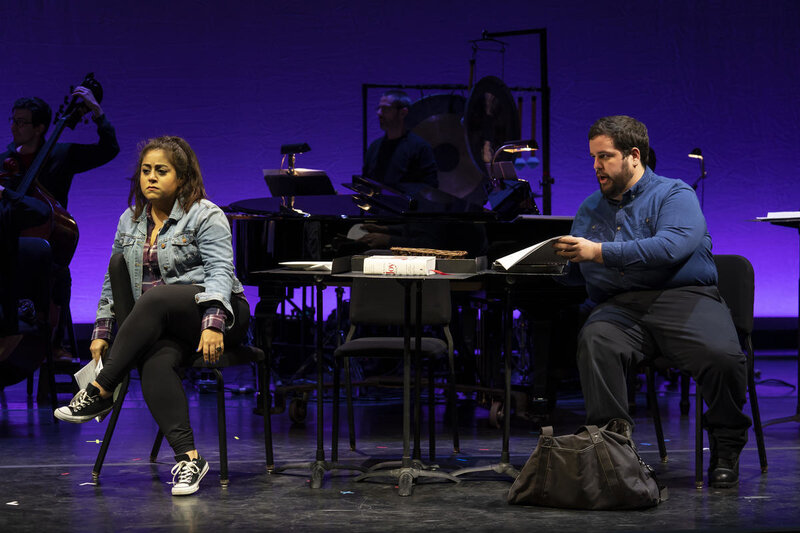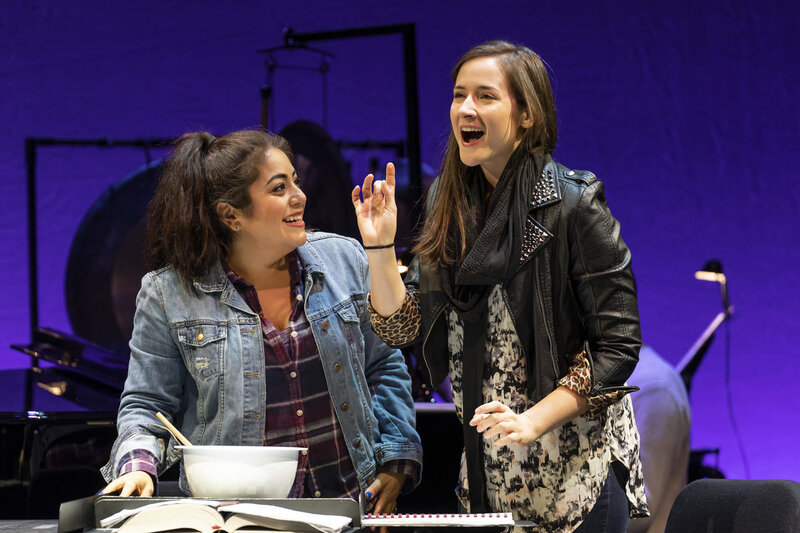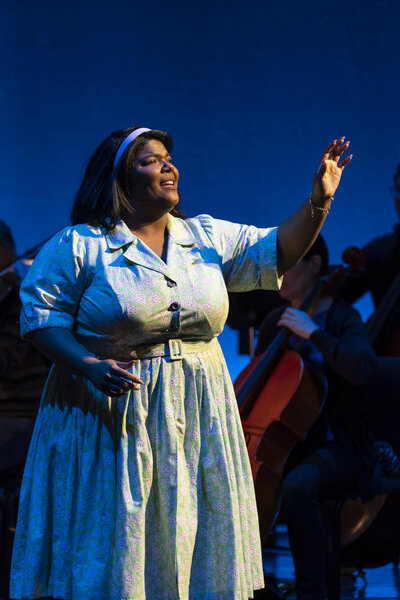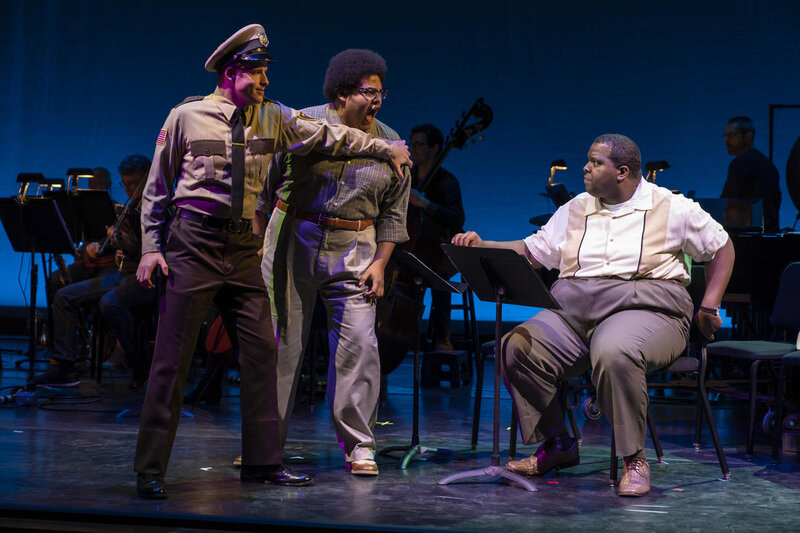Each January in Washington DC new opera blooms. The American Opera Initiative presents a round of newly commissioned works to begin each new year. Typically, one one-hour and three 20-minute operas are premiered. The program was founded in 2012 and has sponsored the premieres of over 50 contemporary American operas. This year, the one-hour entry has effectively been replaced with Washington National Opera’s DC premiere of Blue which will take place in March. Friday night in the Kennedy Center Terrace Theater, the AOI presented three new 20-minute works: Woman of Letters, Admissions, and Night Trip.
I consider these AOI productions to be one of the highlights of each opera season, presenting fresh new works that speak directly to current American culture. For those of us who love new opera, it is an oasis. Each entry in Friday night’s program presented a vignette from American life, and in each, a central character or two experiences a moment of truth, a truth transmitted to the audience through words and music. While the focus is on American stories, the conflicts, emotions, and aspirations are representative of people everywhere. One must keep in mind that classic operas typically run for 3-4 hours. Composers and librettists for these short operas must present the characters and scene, build the tension, and reach a resolution in just 20 minutes. And singing a story takes longer than simply acting a story, so the music must also be telling the story. All singers come from the Domingo-Cafritz Young Artist Program for these performances, and the orchestra is a chamber ensemble taken from the WNO orchestra.
A key feature of the American Opera Initiative is to provide mentoring and exposure to other opera professionals to the new composers and librettists during the development of the operas. This year’s mentors are composer Laura Kaminsky, librettist Kelley Rourke, and conductor Ann Manson. Each has established careers in opera: Ms. Kaminsky is the composer of the highly successful opera, As One; Ms. Rourke is a successful librettist and is also the dramaturg for Washington National Opera; and Ms. Manson has conducted at music houses around the globe and is currently the music director for the Manitoba Chamber Orchestra. Additionally, teamwork among creative staff and performers is encouraged in bringing these productions to fruition. The operas are semi-staged, presented in concert, and all were directed by Amanda Consol.
Woman of Letters photos: first photo - Marlen Nahhas as Sonya and Samuel J. Weiser as Sam; second photo - Marlen Nahhas as Sonya and Alexandra Nowakowski as Dara. Photos by Scott Suchman; courtesy of Washington National Opera.
Woman of Letters by composer Liliya Ugay and libretto by Sokunthary Svay presents an inflection point in the evolving relationship between an immigrant daughter and father living alone together. The father Sam has inspired the daughter Sonya’s imagination (and inhibited her wandering outside the home) by bringing her books from his job as a janitor at a local university. This status quo must change when she receives a scholarship to attend college in Britain, and though, at first, he refuses to let her go, they reach a new, still fulfilling understanding of their relationship. Soprano Marlen Nahhas as Sonya and bass Samuel J. Weiser as Sam gave convincing performances conveying the emotions with their voices. Soprano Alexandra Nowakoswski appearing as Dara, a flighty friend lapsing into opera trills, added levity and perspective. The story might benefit from a more elaborate playing out of the transition the father undergoes but that would require more time. The small ensemble of thirteen instruments including a piano, was led in all three operas by Ms. Manson and played each new score effectively. In my brief, first time, hearing of the music for Woman of Letters, the image that came to mind was a collage of instruments, an impressionistic collage that worked to provide color to the scenes.
Admissions photo: l to r, William Meinart as Father, Amanda Lynn Bottoms as Mother, and Marlen Nahhas as Daughter. Photo by Scott Suchman; courtesy of Washington National Opera.
Admissions by composer Michael Lanci and librettist Kim Davies shows a movie star mother, a business tycoon father and their two kids as the mother is accused of giving bribes to gain a college acceptance for her daughter; hmmm, where did they get that idea? It’s an opera dramedy. The ways that life-styles and thereby life can warp us are exposed in comedic fashion but ends with a sincere (or not?) motivation of a mother to give to her children what she did not have. A strong cast included soprano Marlen Nahhas as the daughter, tenor Matthew Pearce as the son, mezzo-soprano Amanda Lynn Bottoms as the mother, and bass William Meinert as the father. Ms. Nahhas, Mr. Pearce, and Mr. Meinert sang well and gave convincing portrayals of their roles, particularly the comedic elements. I especially enjoyed the tenderness of Ms. Bottoms singing and approach to her role. The music here seemed to have more specific definition in supporting the characters with fine playing by the orchestra.
Night Trip photos: first photo - Rehanna Thewell as Conchetta; second photo, l to r - Samuel McCrady as Officer, Joshua Blue as Uncle Mack, and Joshua Conyers as Uncle Wesley. Photos by Scott Suchman; courtesy of Washington National Opera.
While Woman of Letters tugs at our heart strings and Admissions allows us to laugh at ourselves, Night Trip by composer Carlos Simon and librettist Sandra Seaton is a punch to the gut. Two black WWII veterans begin a car ride from Chicago to Tennessee to transport their young niece to see her family. Their encounter with a white gas station attendant and a white cop is scary; they save themselves by giving up their money. This stark confrontation with racist cruelty lifted a veil from their niece’s eyes, changing her forever. The players in this drama gave very strong performances, Joshua Conyers as Uncle Wesley, tenor Joshua Blue as Uncle Mack, tenor Matthew Pearce as the gas station attendant, and baritone Samson McCrady as the Police Officer. I saved the best for last; mezzo-soprano Rehanna Thelwell was riveting as Conchetta. She first appears commanding the stage, full of life, singing beautifully, and by the end, commanding the stage, singing knowingly. The music utilized idioms from other genres, such as jazz and swing, and seemed the most assured of the three operas in presenting the characters.
These were three exciting entries in AOI’s annual event. I can also report that no kings, queens, knights, duels, or double suicides by lovers were involved. No, these were stories we could all readily identify with. Therein lies a challenge for new opera, I think. We live in a period when the mainstream is more focused on psychological than external change. Ms. Kaminsky spoke of the need for the music, the voices, and the words to work together to communicate the truth of the stories. Opera has feasted on truths revealed by grand passions and highly dramatic music. Telling important truths where important changes are taking place internally requires a new type of music. AOI’s new operas are exploring these new directions. AOI has a great concept – give creative people resources and let them create. Sadly, Spring only comes once a year.
The Fan Experience: These AOI performances were presented in the Kennedy Center Terrace Theater only on Saturday night, at 7 pm and again at 9 pm. The Terrace Theater only holds 450 patrons, so get your tickets early for next January.





